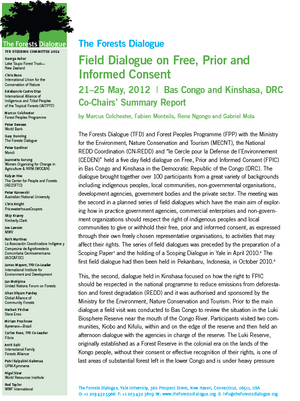Co-chairs’ Summary : Second Dialogue on FPIC – Kinshasa, DRC
The Forests Dialogue (TFD) and Forest Peoples Programme (FPP) with the Ministry for the Environment, Nature Conservation and Tourism (MECNT), the National REDD Coordination (CN-REDD) and “le Cercle pour la Defense de ’Environnement (CEDEN)” held a five day field dialogue on Free, Prior and Informed Consent (FPIC) in Bas Congo and Kinshasa in the Democratic Republic of the Congo (DRC). The dialogue brought together over 100 participants from a great variety of backgrounds including indigenous peoples, local communities, non-governmental organisations, development agencies, government bodies and the private sector. The meeting was the second in a planned series of field dialogues which have the main aim of exploring how in practice government agencies, commercial enterprises and non-government organizations should respect the right of indigenous peoples and local communities to give or withhold their free, prior and informed consent, as expressed through their own freely chosen representative organisations, to activities that may affect their rights. The series of field dialogues was preceded by the preparation of a Scoping Paper and the holding of a Scoping Dialogue in Yale in April 2010. The first field dialogue had then been held in Pekanbaru, Indonesia, in October 2010.
This, the second, dialogue held in Kinshasa focused on how the right to FPIC should be respected in the national programme to reduce emissions from deforestation and forest degradation (REDD) and it was authorised and sponsored by the Ministry for the Environment, Nature Conservation and Tourism. Prior to the main dialogue a field visit was conducted to Bas Congo to review the situation in the Luki Biosphere Reserve near the mouth of the Congo River. Participants visited two communities, Kiobo and Kifulu, within and on the edge of the reserve and then held an afternoon dialogue with the agencies in charge of the reserve. The Luki Reserve, originally established as a Forest Reserve in the colonial era on the lands of the Kongo people, without their consent or effective recognition of their rights, is one of last areas of substantial forest left in the lower Congo and is under heavy pressure from illegal logging and hunting. It is now being considered for a REDD project. The field visit was followed by an intensive two days of discussions in the national capital, Kinshasa, to draw lessons from the field and from participants’ wider experiences.

